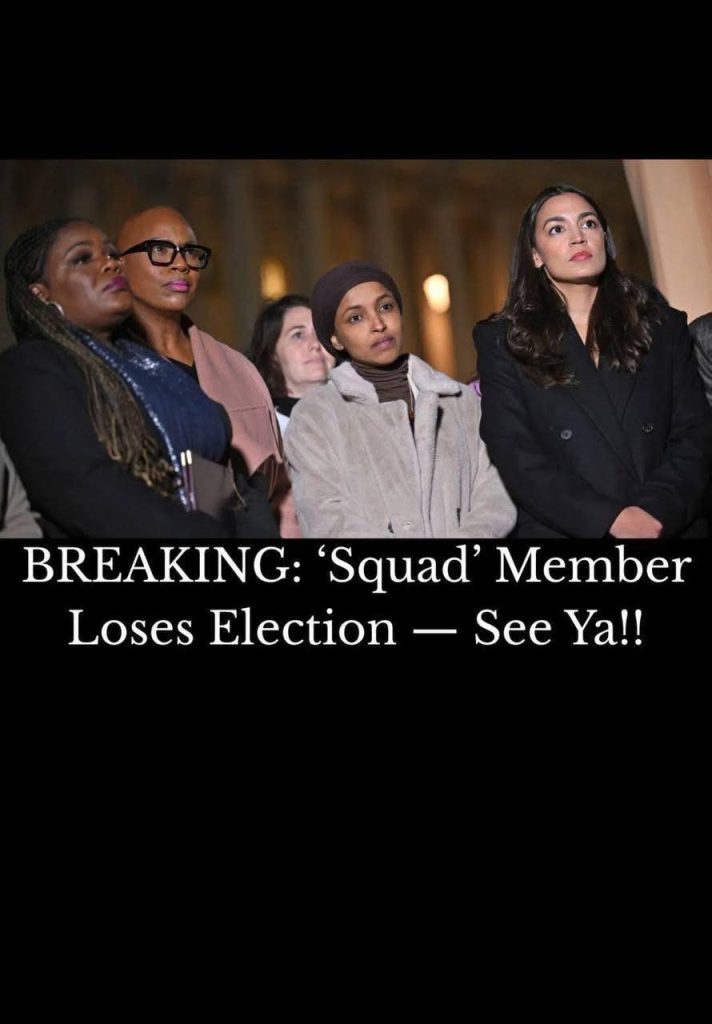Missouri Congresswoman Cori Bush, one of the most prominent members of the progressive “Squad” in the U.S. House of Representatives, suffered a major political setback Tuesday night after losing her Democratic primary race to St. Louis County Prosecutor Wesley Bell.
The defeat marks the second time a member of the progressive bloc known as the “Squad” has lost a congressional seat this cycle, signaling potential challenges for the left wing of the Democratic Party heading into future elections.
A Decisive Loss in Missouri
Decision Desk HQ projected Bell’s victory shortly after polls closed, with the prosecutor leading by a comfortable margin. With nearly all votes counted, Bell secured approximately 54.9% of the vote compared to Bush’s 41.8%.
Bell, who has served as St. Louis County’s top prosecutor since 2019, ran a campaign that emphasized pragmatic progressivism, local priorities, and a focus on criminal justice reform without the confrontational tone that has sometimes defined Bush’s national profile. His message appeared to resonate with voters who were seeking stability and consensus after several years of political turbulence.
Bush, who gained national attention after her election in 2020, rose to prominence as a Black Lives Matter activist from Ferguson, Missouri. She ran as part of the “Squad,” a group of progressive House Democrats that also includes Reps. Alexandria Ocasio-Cortez, Ilhan Omar, Rashida Tlaib, Jamaal Bowman, and Ayanna Pressley.
While Bush’s campaign maintained strong grassroots support, she faced mounting criticism over her handling of local issues, her stance on Israel’s war in Gaza, and a federal investigation into her campaign’s spending on private security.
Republicans Celebrate the Defeat
Bush’s loss sparked a flurry of reaction across social media, particularly among conservatives who have often criticized her progressive views on policing, foreign policy, and race relations.
Pro-Trump comedian Terrance K. Williams was among the first to respond, posting on X (formerly Twitter):
“A ‘BLACK JOB’ IS SOMETHING CORI BUSH DOES NOT HAVE. OH HAPPY DAY! She is the second Squad member to lose her seat! I can’t wait until they are all gone. They are all full of hate and stupidity. I’m laughing so hard. Who’s laughing with me?”
Other Republican figures joined in, with Representative Matt Gaetz (R-Fla.), a member of the House Judiciary Committee, writing sarcastically:
“I will miss Cori Bush missing every committee meeting.”
Ryan Fournier, co-founder of the conservative youth organization Students for Trump, added his voice as well:
“The Squad’s Cori Bush has LOST her primary. Join me in saying GOOD RIDDANCE!”
Broader Reactions and Political Commentary
The reactions were not limited to Republican politicians or activists. Actor Michael Rapaport, a vocal supporter of Israel and frequent political commentator, also weighed in on the news. Referencing Vice President Kamala Harris’s recent campaign event with Minnesota Governor Tim Walz, Rapaport wrote:
“Tonight at the rally they said, ‘Let’s bring back joy to politics,’ and boom—Cori Bush is done with politics. I feel JOY all of a sudden.”
Bush’s loss comes amid broader debates within the Democratic Party about its ideological direction and how to balance progressive ideals with electoral pragmatism. Some political analysts view her defeat as a sign that voters in certain districts may be growing wary of candidates who focus heavily on national activism at the expense of local issues.
A Shift in the “Squad’s” Influence
Bush’s defeat follows the primary loss of Rep. Jamaal Bowman (D-N.Y.), another member of the Squad, who was unseated earlier this year. Together, their losses have raised questions about the political durability of the movement that once energized the progressive base and challenged establishment Democrats.
The “Squad” emerged as a symbol of youthful energy and left-wing enthusiasm in 2018 and 2020, advocating for policies such as the Green New Deal, Medicare for All, and police reform. However, the group has also faced criticism from both Republicans and moderate Democrats for positions that some view as divisive or unrealistic.
While figures like Alexandria Ocasio-Cortez and Ayanna Pressley have maintained strong support in their respective districts, Bush’s and Bowman’s defeats suggest that the movement’s hold is not universal.
Campaign Challenges and Controversies
Bush’s campaign faced several challenges leading up to the primary. In addition to scrutiny over campaign expenditures on private security—an issue that drew attention given her outspoken calls to “defund the police”—she faced criticism from some voters who felt she focused too heavily on national issues rather than local concerns.
Her outspoken criticism of Israel’s actions in Gaza also drew backlash from pro-Israel groups and some members of her own party. Several analysts suggested that this stance may have alienated moderate and older Democratic voters in her district, who traditionally support more centrist positions on foreign policy.
Meanwhile, Wesley Bell’s campaign capitalized on these weaknesses by presenting himself as a candidate focused on practical governance and community engagement. Bell avoided ideological extremes, emphasizing his record as a prosecutor who had implemented reforms while maintaining public safety.
In his victory speech, Bell thanked his supporters and pledged to serve “all residents of Missouri’s 1st District,” regardless of political affiliation. He described his campaign as “a call for progress rooted in compassion, accountability, and results.”
Looking Ahead
Bush has not yet indicated what her next steps will be following her defeat. In a statement issued to supporters, she thanked her constituents and vowed to continue advocating for social justice and equality, regardless of her position in government.
“This movement is bigger than one election,” Bush said. “I will keep fighting for the people who are too often left behind and for a government that truly serves everyone.”
Despite her loss, Bush’s impact on national politics remains significant. Her activism and her role in the “Squad” helped shape Democratic debates on policing, housing, and racial equity. However, the outcome of her race underscores the challenges progressive candidates face in districts where ideological divides run deep.
As the 2026 election cycle approaches, Bush’s defeat—and Bowman’s before her—will likely prompt introspection among progressives about strategy, messaging, and the future of their movement within the Democratic Party.
For Republicans, meanwhile, Bush’s loss was seen as a symbolic victory. Conservative commentators framed it as evidence that the influence of the far-left in Congress may be waning. Whether this marks a broader political realignment or simply a shift within specific districts remains to be seen.


